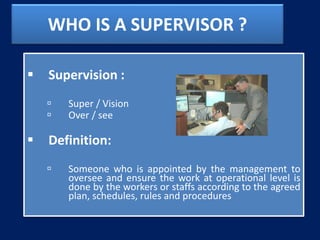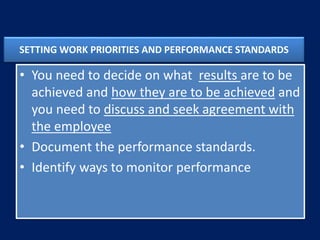Effective Supervisory Skills for Managers
- 1. WELCOME EFFECTIVE SUPERVISORY SKILLS FOR MANAGERS
- 2. LET’S GET TO KNOW MORE ABOUT EACH OTHER
- 3. OBJECTIVES What it takes to become a supervisor of substance/quality The know how of task management The finer points of people management
- 4. WHO IS A SUPERVISOR ? Supervision : Super / Vision Over / see Definition: Someone who is appointed by the management to oversee and ensure the work at operational level is done by the workers or staffs according to the agreed plan, schedules, rules and procedures
- 5. WHO IS A SUPERVISOR ? Supervisor is the First Line Manager who.. Manages the work activities Manages the operative workers With limited authorities
- 6. WHAT IT TAKES TO BECOME A SUPERVISOR OF SUBSTANCE/QUALITY
- 7. SUPERVISORY FUNCTIONS Planning Organizing Leading Inspiring Control Evaluation P . O . L . I . C . E
- 8. WHAT IS YOUR CURRENT LEVEL OF PERFORMANCE AS A SUPERVISOR? • Self-Assessment : Please assess yourself based on the questionnaire
- 9. PERSONAL BEHAVIOR TRANSFORMATION • Attitude is the little thing that makes a lot of difference in life. • Thinking in an Positive Way, only increases your attitude, gives additional energy. • One who has the talent is not always the one who achieves, only those who have discipline to follow-through achieve. .
- 10. PERSONAL BEHAVIOR TRANSFORMATION • Love what you do,; you will produce good results. • Faith in Yourselves will push you to take action, even when there is repeated failure
- 11. SUPERVISORY QUALITIES • Develop Passion in the person for the work he is doing you need not supervise him at all. “Real measure of leadership quality is not what happens in your presence but what happens in your absence.”
- 12. SUPERVISORY QUALITIES • Earn Respect : • You be on time, • You do not talk unnecessarily • You be regular to work • You show the enthusiasm and commitment. • You do things which are respectable • You be disciplined in your actions and words.
- 13. SUPERVISORY QUALITIES • Accountable : You are responsible for the results, unless there was deliberate disobedience of your order or a sabotage from the workers.
- 14. SUPERVISORY QUALITIES • Social Skill : Criticize privately, praise publically.
- 15. SUPERVISORY QUALITIES • Fairness. Many labour issues arise because the workers do not feel they have been treated fairly and equally. • Expect good work from everyone.
- 16. SUPERVISORY QUALITIES • Adaptable. Be ready to manage changes efficiently; be willing to learn
- 17. SUPERVISORY QUALITIES • Be Cool and Calm; maintain self-control; don't lose temper. Do not shout; do not swear.
- 18. SUPERVISORY QUALITIES • Be Approachable: Without shutting off feedback by scolding, judging, moralizing and give importance to their concern. Listen to workers, managers, customers.
- 19. SUPERVISORY QUALITIES • Know Their Jobs. Effective supervisors possess thorough knowledge of the each worker’s job. • Make Things Happen. When others are intimidated or overwhelmed, jump in front and show “it can be done ”
- 20. SUPERVISORY QUALITIES • Committed and Responsible. Most employees admire supervisors who are committed to the organization and management policies. • “Being a management rebel may give short- term popularity, but affect the long term effectiveness”
- 21. SUPERVISORY QUALITIES Be Innovative : • Have courage to try new methods • Help others to do in a new way Be Proactive : Take initiative and make things happen. .
- 22. SUPERVISORY QUALITIES • Give clear Instructions and ensure it is understood correctly.
- 23. SUPERVISORY QUALITIES • Be a good trainer • You do not do the job; train others to learn the job, instead. • Cross train the people in different functions.
- 24. THE KNOW HOW OF TASK MANAGEMENT
- 25. ACTIVITY • Brainstorm – what are first things that come to mind when we say performance management? • Evaluate your own experiences of being managed? – What did you value? – What were/are your feelings about these processes? – What encourages /or would encourage you to engage in these processes as a staff member? • What motivates you in the work that you do? Do you think these are the same motivators for the staff that you manage?
- 26. SETTING WORK PRIORITIES AND PERFORMANCE STANDARDS • Know what the objectives and KPIs are for your the unit • Review the employees job description • Determine what tasks and responsibilities within the job description are important or should receive greater priority given the business unit objectives and KPIs.
- 27. SETTING WORK PRIORITIES AND PERFORMANCE STANDARDS • Discuss with the employee the impacts of the objectives and KPIs on their job role – get their views and perspectives – do they agree? Identify key tasks/actions that need to be prioritized and document these as part of the performance plan • Determine what standards need to be achieved in the performance of these tasks
- 28. SETTING WORK PRIORITIES AND PERFORMANCE STANDARDS • You need to decide on what results are to be achieved and how they are to be achieved and you need to discuss and seek agreement with the employee • Document the performance standards. • Identify ways to monitor performance
- 29. SETTING WORK PRIORITIES AND PERFORMANCE STANDARDS • Develop a plan to review performance • Discuss how you can help or support the employee to meet the standards: – Training – Equipment – Revise work systems • Take action on reasonable requests for support
- 30. ACTIVITY • What planning processes exist in your organisation? Put together a flow chart of how you think planning processes occur and highlight where your business unit /role fits into this process.2. Evaluate your own experiences of being managed? • What documents exist within your organisation and immediate workplace that would impact on the range of work tasks performed, the priority of such tasks or how and when they should be performed. (e.g. planning documents, policies etc.)
- 31. THE FINER POINTS OF PEOPLE MANAGEMENT
- 32. PEOPLE ISSUES • Why there are “trouble makers” • They are bored • They want attention, so challenge authorities. • They have not learnt to respect the system/ organization. • They are frustrated.
- 33. BEHAVIORAL ISSUES • Reprimanding the poor behavior : • Every violation should be appropriately dealt with. • If not, it will lead to low morale, employee turn over, low productivity. • If there is a conflict, resolve it by attending to it immediately and not to allow to grow and burst.
- 34. DICIPLINARY ACTIONS • Corrective Options: 1) Enquiring and making comments 2) Verbal warning 3) Written warning 4) Suspension 5) Dismissal
- 35. COUNSELING SESSIONS • Give Feed back If a worker did not do the work properly : • Call him and inform him your displeasure. • Politely but firmly inform them of the consequences of poor performances.
- 36. ACTIVITY • Your best moment as a supervisor • How and what did you do you motivate your staffs?
- 37. 89% X $ 6 Hidden Reasons Employees Leaving - Leigh Braham MOTIVATE OR DE-MOTIVATE ?
- 38. 1. SPENDING TIME WITH THEM How much time you spend with your subordinate per week ?
- 39. 1. SPENDING TIME WITH THEM Share with us your best time with your subordinate?
- 40. 1. SPENDING TIME WITH THEM Why is it important? Coaching - Guide Follow up – Help Caring – Family, Work
- 41. 2. FOCUSING ON THEIR STRENGTH • Strengths more than weakness • Opportunities rather than problems • What can be done instead of what can’t
- 42. 3. CREATE AN NO FEAR ENVIRONMENT Coaching instead of Blaming Solving Problem Together (Support) Firm - Friendly
- 43. 4. DELEGATING JOBS EFFECTIVELY Explain Why Job Is Important Define Results Wanted Authority Agreed On Deadline Ask For Feedback Set Up Controls
- 44. 5. CLEAR COMMUNICATION WIIFM? Bit by Bit – (examples, pictures) Feedback (repeat) Questions Follow Up
- 45. 6. INSPIRING THEIR WORK YOUR STYLE: BRAGGER OR LEADER
- 46. 6. INSPIRING THEIR WORK • Braggers take the majority of credit for their team’s accomplishments. They believe this impresses the higher ups. Braggers will also be first to lay the blame for problems on someone other than themselves. It this puts an individual team member – or everyone else but the Bragger – in an unfavourable light, at least the Bragger comes out smelling like roses. Or so the thinking goes.
- 47. 6. INSPIRING THEIR WORK • Leaders, on the other hand, take less credit and accept more of the blame. From their perspective they are being the bigger person: it shows humility admitting personal responsibility for their team’s errors; and demonstrates self-confidence when highlighting their team’s role in triumphs.
- 48. 6. INSPIRING THEIR WORK • To inspire your employees, try shouldering more blame and sharing more credit. • However it can also gains you the respect of your team. And shows the higher ups that you have leadership qualities above and beyond the norm.
- 49. 6. INSPIRING THEIR WORK • Reward the efforts of your employees by highlighting their individual achievements when informing senior managers about successes. • Mention your team members by name whenever possible, rather than always calling them “my team”. • Accept more of the blame when your team fouls up. • Provide opportunities for those employees of yours who mess up to redeem themselves.
- 50. PUT IT TO ACTION - MAKE IT HAPPEN THANK YOU


















































